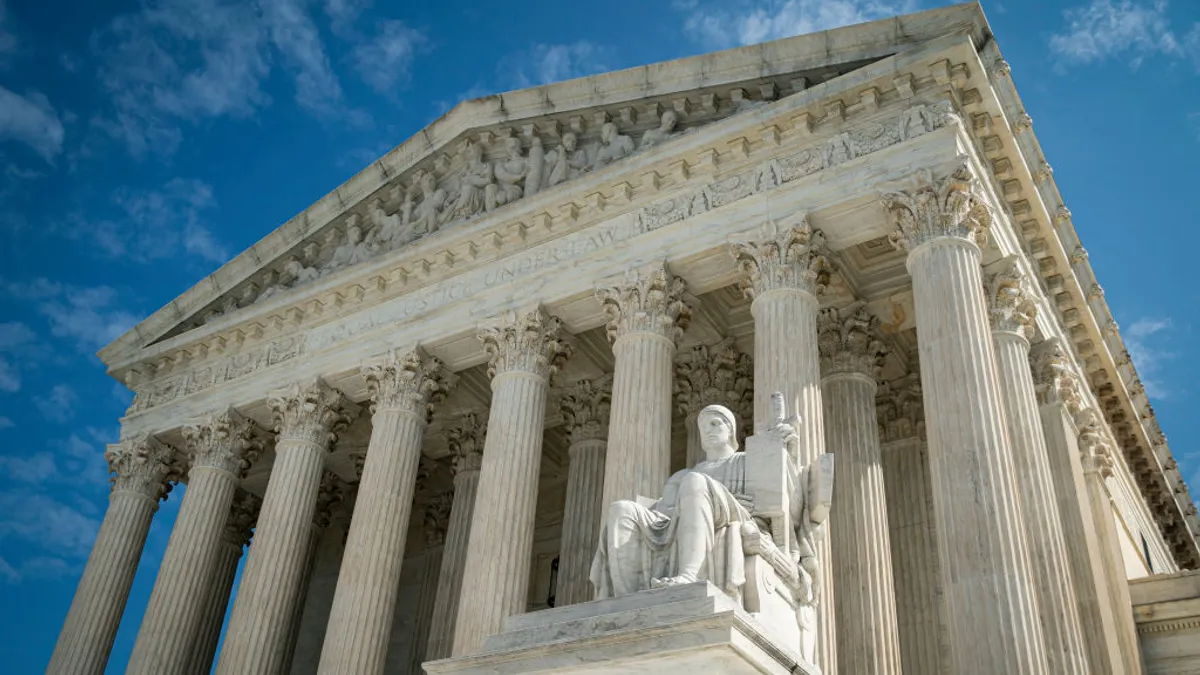Dive Brief:
- The U.S. Supreme Court agreed Thursday to review the legality of the Biden administration’s plan to forgive broad amounts of student debt and expects to hold oral arguments in February.
- Lower courts have blocked the program from taking effect. The Biden administration asked the justices in November to either review the program or lift a nationwide injunction against it.
- Thursday’s action will expedite review of the case. However, the Supreme Court deferred ruling on whether to lift the injunction, meaning the plan will remain blocked while the justices hear the case.
Dive Insight:
President Joe Biden’s student loan forgiveness proposal has been met with a flurry of legal challenges that threaten to squash the program altogether. His plan would forgive up to $10,000 in federal student loan debt for borrowers who earn up to $125,000, or $250,000 for couples filing jointly. Pell Grant recipients would qualify for up to $20,000 in debt relief.
The Biden administration must now defend the proposal to a Supreme Court with a strong conservative majority. Some legal scholars have argued that the U.S. Department of Education’s justification for the plan is weak and as such risks being struck down by the top court.
The Education Department has based its authority to create the loan forgiveness program on a 2003 law known as the Higher Education Relief Opportunities for Students Act, or Heroes Act.
While the law was enacted to help military members, it gives the education secretary power to waive or change student financial aid rules during wars, military operations or national emergencies.
The Biden administration has argued the pandemic qualifies as such an emergency. It says the debt relief program will help prevent borrowers from defaulting on their loans when it lifts a pause on payments that began during the health crisis.
But legal scholars have pointed out that the Supreme Court has struck down other major policies that the administration has used the pandemic to justify.
Earlier this year, for instance, the high court declared key parts of the Biden administration’s coronavirus vaccine mandate unlawful. And in 2021, the justices voided an eviction moratorium protecting certain tenants if they were living in areas of rapid coronavirus spread.
The Supreme Court’s decision to take up the student loan case stems from a lawsuit brought by six conservative states. They argue both that the Education Department lacks authority to implement the plan without congressional approval and that it will harm their finances.
In court documents, the six states said the Heroes Act has only been used before to “grant relief to limited subsets of borrowers” and that the Education Department was overstepping statutory authority.
“The Department asserts power under the Act to cancel student-loan debt, of any amount, for any borrower, even a decade or more after a national emergency begins,” they argued. “In other words, the agency believes that it has authority to erase all $1.6 trillion in student-loan debt, effectively converting the student-loan program into a student-grant program.”
Their case is not the only major legal threat to the debt relief plan. In a separate lawsuit, a federal judge in mid-November ruled the program unlawful. The 5th U.S. Circuit Court of Appeals declined Wednesday to temporarily block that ruling while the Biden administration appeals it.
Following these legal setbacks, the Education Department announced last month that it is continuing a pause on federal student loan payments and interest accrual that began in March 2020. The agency said the freeze would remain until it could implement its debt relief plan or lawsuits against the program were resolved.















